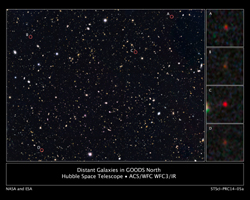
Click on the image for larger poster versionThis is a portion of a deep-sky Hubble Space Telescope survey called GOODS North (Great Observatories Origins Deep Survey). The view is a composite of images taken in visible and near-infrared light by NASA's Hubble Space Telescope. Researchers have circled four unusually red objects (see poster version) that appear as they existed just 500 million years after the big bang. They appear red because their light has been stretched to longer infrared wavelengths by the expansion of the universe. These extremely compact and bright galaxies present a puzzle to researchers because they are much more luminous than anything previously seen at such an early epoch. The young galaxies are bright because they are forming stars at a much faster rate than for other galaxies found at such early times.
Using NASA's Spitzer Space Telescope, the astronomers were able to estimate the stellar masses by measuring the total stellar luminosity of the galaxies.

